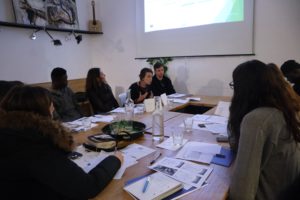[:en]
 In the recent years the European labor market has been facing many different challenges, including skill shortage, ageing workforce and lack of motivated apprentices. The high number of refugees that have entered Europe in the recent years might be a solution to these problems – however companies are hesitant to hire refugees due to their unclear professional and educational background, their different culture and religion and their legal situation.
In the recent years the European labor market has been facing many different challenges, including skill shortage, ageing workforce and lack of motivated apprentices. The high number of refugees that have entered Europe in the recent years might be a solution to these problems – however companies are hesitant to hire refugees due to their unclear professional and educational background, their different culture and religion and their legal situation.
REST is a European project, co-financed by AMIF of the European Union with the aim to contribute to a better integration of refugees into the European labor market. The project also works to encourage employers to recruit and integrate refugees in their business, which includes getting rid of the stigma surrounding refugee workers as well as how to deal with cultural and religious diversity in the workplace.
Integrating refugees into the labor market have many benefits – for the refugee, for the company and for the labor market. When it comes to the refugees, they will have income, they will have the opportunity to practice and become more fluent in the local language, expand their network and become more socially integrated. The companies will have the opportunity to get new perspectives, or learn new ways of doing specific tasks as the refugees possesses different work experiences and are custom to different ways of working. The companies will also learn new cultures and get a broader diversity among the employees, which will reflect well on the company’s image. When it comes to the labor market, employing refugees and other minorities are important in overcoming prejudice, discrimination and stereotypes when it comes to immigrant workers, it will contribute to a broader and more diverse labor force, and last but not least, immigrant workers will contribute in a positive way in the economy and will be a solution to the aforementioned challenges in the labor market.
However, refugees face many barriers when it comes to entering the labor market. Discrimination and prejudice is central but the biggest barriers are administrational or legal – to get legal residence permit and work visa is a major challenge especially after the new regulations from 2018. The new regulations have eliminate one form of protection for refugees – and now they can only apply for one year humanitarian protection, which can not be renewed but only exchanged into a work visa, and that is only possible of the refugee already have a job. Without a legal resident permit, the immigrants are not able to get a job and not able to banking service and many more services. Another obstacle is the application for a permanent resident permit, in order to be eligible the applicant have to finish schooling in Italy, and have valid identification – the latter poses the biggest problem – as many of the immigrants entering Italy don’t have identification.
As long as the refugees possess a legal resident permit – companies are able to employ and integrate them into their business. In order to increase the number of refugees in the labor market, it is necessary to train employers – here are some information employers might find useful:
- Employers need to be as clear about tasks and expectations as possible – refugees are costumed to different work environments and in order to avoid miscommunication this is essential.
- Employers should be flexible when it comes to religious and cultural diversity. Some religious/cultural aspects that the employer should know about are e.g. Ramadan, hijab and other religious/cultural clothing, handshake and other contact between man and women.
- Employers should also be aware about the Italian constitution article 19 and 41, that protects the immigrant’s religious freedom.
[:]


Comments are closed